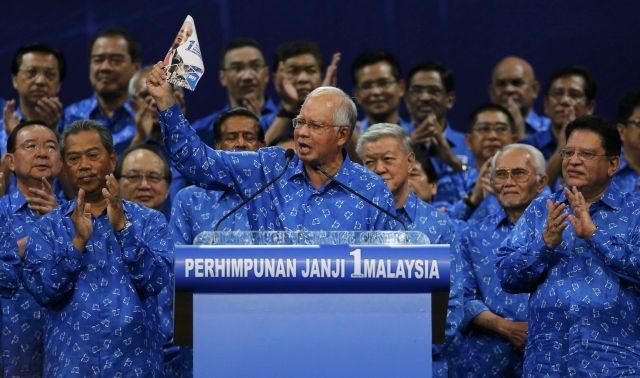Malaysia To Hold Parliamentary Elections On May 5; Ruling Coalition Braces For Stiff Competition

Malaysia will hold general elections on May 5, the election commission announced on Wednesday, as the nation’s ruling coalition for 56 years braces for a stiff competition.
The National Front led by Prime Minister Najib Razak, has been under pressure to restore the two-thirds majority the coalition lost for the first time in 2008.
Najib, the leader of the United Malays National Organization, the main party in the National Front ruling coalition, dissolved parliament last week and will serve as caretaker prime minister until the elections.
Opinion polls suggest a narrow victory for the National Front, Reuters news agency reported.
Najib’s rise to power in April 2009 was marked by a government crackdown on the opposition, with allegations that coercive tactics were being used to stifle political dissent. In July 2011, a protest in the capital Kuala Lumpur calling for electoral reform was forcibly broken up by the police. However, the following month the government set up a cross-party parliamentary committee to study electoral reform.
The son of the country's second prime minister and nephew of the third, Najib is a British-trained economist.
He took over the premiership when Malaysia was hit hard by the global financial crisis, which hit its export markets hard. In March 2009 the government unveiled a $16 billion economic stimulus plan as part of the efforts to avoid plunging the country into a deep recession.
Malaysia’s opposition is a broad coalition which includes moderates, Islamists and Malaysians of Chinese descent.
Anwar Ibrahim, who leads the opposition, is seen as one of the great survivors of Malaysian politics, according to the BBC. Anwar once served as deputy prime minister under the National Front, but subsequently fell out with then Prime Minister Mahathir Mohamad, who sacked his deputy and presumed successor in 1998 on charges of sexual misconduct, against the background of differences between the two men over economic policy.
Ibrahim was found guilty of sodomy in 2000 and sentenced to nine years in prison. This was added to the six-year jail sentence he was given in 1999 after he was found guilty of corruption following a controversial trial.
Ibrahim was freed in 2004 when a court overturned his sodomy conviction, after Abdullah Ahmad Badawi took over as prime minister succeeding Mahathir Mohamad.
In 2007, Ibrahim's Parti Keadilan Rakyat lost a bitterly contested by-election to the government. The following year, when Badawi’s government suffered its worst election result in decades, Ibrahim was arrested again over allegations of sodomy, escalating political tensions.
In January last year a Malaysian court acquitted Ibrahim of the charges.
© Copyright IBTimes 2025. All rights reserved.






















